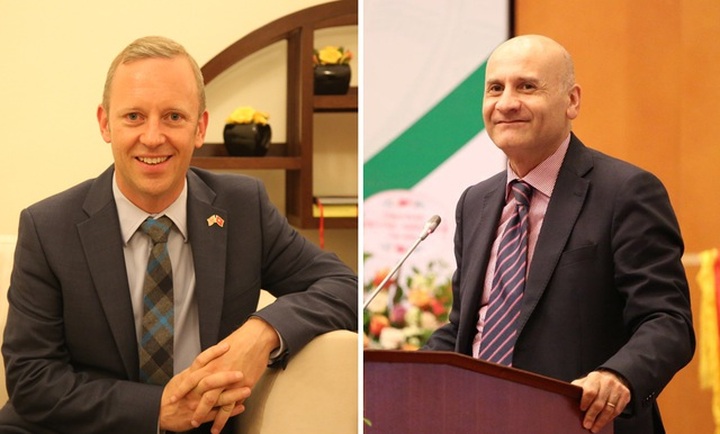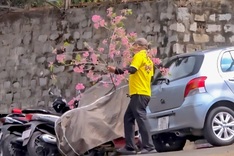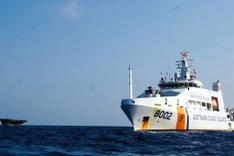The UK, in partnership with Italy, has been nominated to host COP26 in 2020. On this occasion, British ambassador to Vietnam, Gareth Ward, and Italian ambassador Antonio Alessandro jointly wrote an Op-ed on climate change in which they shared their expectation to work closely with Vietnam on climate and sustainability during Vietnam ASEAN chairmanship next year.

British ambassador to Vietnam, Gareth Ward (left) and Italian ambassador Antonio Alessandro (Photo by the British and Italian Embassies)
The following is the full text of their joint article:
As British and Italian Ambassadors working in Vietnam for the past year, we have been fortunate to travel all around this beautiful country. As well as visiting the thriving cities, we have been by train, car, bicycle and boat through the hills and forests of the North-West, along the coast of Central Vietnam, and through the world’s second most biodiverse delta in the Mekong. We have learned about the richness of the natural environment, which is a major factor in Vietnam’s increasing prosperity.
Unsustainable models of economic growth are the reason why biodiversity is under threat around the world. We are witnessing our planet’s sixth great mass extinction with irreversible losses of plants and animals. One particularly concerning human element in this is the illegal wildlife trade. Rain forests, our planet’s richest source of animal and plant life, are being lost at an alarming rate. Plastics are causing great harm to our oceans. We are losing species and fisherman are finding it harder to sustain their livelihoods. Vietnam, one of the world’s most diverse countries for wildlife in the forests and oceans, is on the front line.
Italy and the UK are not resigned to these negative trends. We can change track. A large part of the answer is to reduce carbon emissions by investing rapidly in green growth. Clean energy, and more sustainable transport, agriculture and industry will mean more jobs, cleaner air, better health and an enriched natural environment. Vietnam has huge potential for renewable energy, particularly solar, wind and biomass. While progress is being made, Vietnam’s renewable energy targets are still relatively modest and projections for the future use of coal are high. Ambitious investment in renewable energy, encouraged by a conducive regulatory framework, would help Vietnam to meet the annual 12% electricity demand growth.
It’s right that countries such as the UK and Italy make big commitments. The UK has already reduced emissions by 43% from 1990 levels, while our economy growing by 72% in that time. Growth and sustainability are compatible. We will go further. Our legally binding Climate Change Act committed us to reduce emissions by 80% by 2050 from 1990 levels. In June this year, we went even further - passing into law a net-zero GHG emissions target by 2050. So the UK is the first major economy to pledge that it will not be contributing to global warming after 2050. Over 30% of the UK’s electricity is generated from renewable sources. And we now produce 40% of the world’s offshore wind. These are UK jobs delivering UK energy security.
Italy has reduced its CO2 equivalent emissions from the 518 tonnes of 1990 to 427 tonnes, with a stable decrease in the past few years. Together with our EU partners, we committed – under the Paris Agreement – to reduce greenhouse gas emissions by at least 40% by 2030 compared to 1990 levels. Renewable energies stood at above 18% of total energy consumption in 2018, with a quota on electricity generation of 39.7% (out of which 49% hydro and 40% wind and solar). Energy efficiency is key to curb GHG emissions. Italy plans to improve it by 43%, well above the 2030 EU target set at 32,5%. Moreover, Italy has implemented a smart metering system to help households keep track of their electricity consumption (36 MLN smart-meters installed at national level).
Italy has pledged a total of 250 million Euro as national contribution to the UN’s Green Climate Fund and started working directly with the Vietnamese Ministry of Natural Resources and Environment, having signed in June 2018 a Memorandum of Understanding in the field of climate change vulnerability, risk assessment, adaptation and mitigation. The records of the UK and Italy on tackling climate change have led to us being nominated to host the UN Conference Of the Parties 26 on Climate Change in 2020. We expect this to be formally confirmed in December. COP26 will be a milestone for ambition; for cleaner energy, a more resilient future and flourishing nature, supported by green financial systems. This is because climate change is not a distant threat – we must act together to accelerate action to reduce emissions, protect our environment and adapt to the consequences that we are seeing all over the world. The UN Climate Change process, including the UN Climate Action Summit, is central to that collective action. The Vietnamese Chair of ASEAN in 2020 is another opportunity to work together.
We have only one planet. Let us work together to make our economies resilient, cleaner and greener – now and for future generations.




















